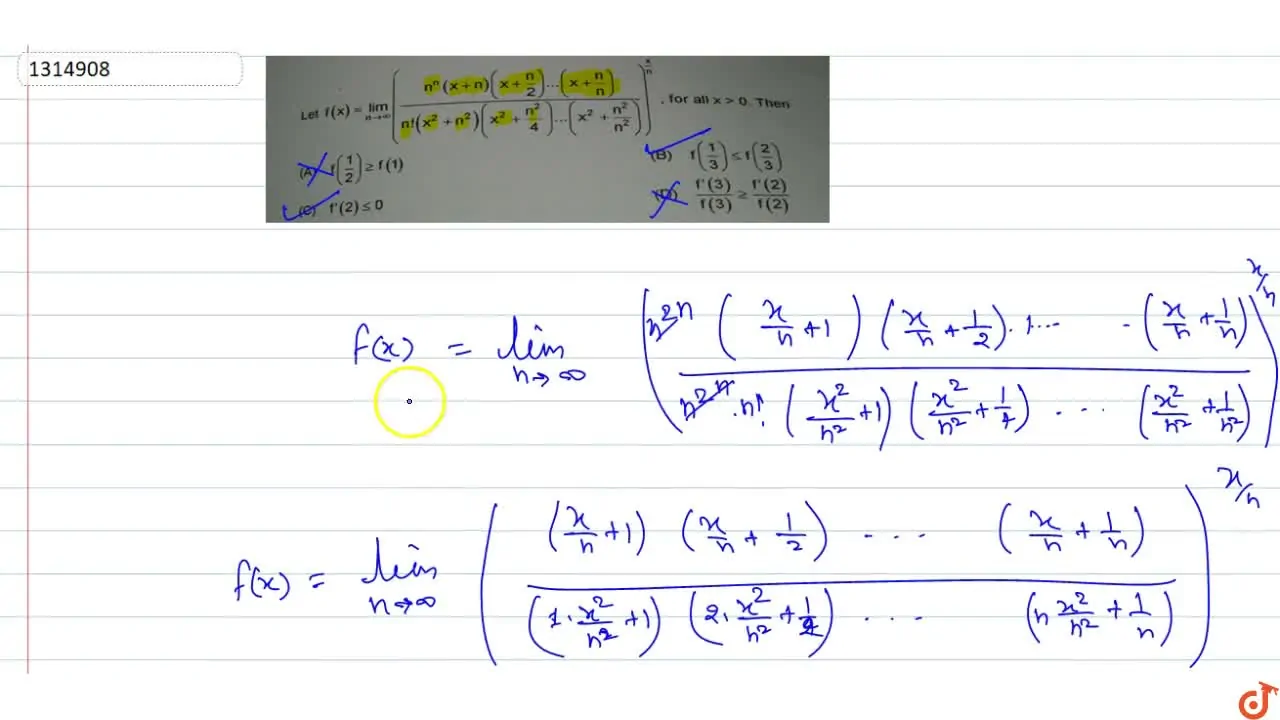Let
f(x)=limn→∞⎧⎪
⎪⎨⎪
⎪⎩nn(x+n)(x+n2)....(x+n2)n!(x2+n2)(x2+n24)...(x2+n2n2)⎫⎪
⎪⎬⎪
⎪⎭x/nfor all x>0. Then,
A
f(12)≥f(1)
B
f(13)≤f(23)
C
f'(2)≤0
D
f'(3)f(3)≥f'(2)f(2)
Video Solution
Text Solution
The correct Answer is:B, C
We have,
f(x)=limn→∞⎧⎪
⎪⎨⎪
⎪⎩nn(x+n)(x+n2)....(x+n2)n!(x2+n2)(x2+n24)...(x2+n2n2)⎫⎪
⎪⎬⎪
⎪⎭x/n
⇒logf(x)=limn→∞xnlog⎧⎪
⎪⎨⎪
⎪⎩n∏r=1(x+nr)(x2+n2r2).nr⎫⎪
⎪⎬⎪
⎪⎭
⇒logf(x)=limn→∞x2n∑r=1log⎧⎪⎨⎪⎩⎛⎜⎝x+nrx2+n2r2⎞⎟⎠.1rn⎫⎪⎬⎪⎭
⇒logf(x)=limn→∞xnn∑r=1log⎧⎨⎩1+rnx1+(rnx)2⎫⎬⎭
⇒logf(x)=xlimn→∞n∑r=1log⎧⎨⎩1+rnx1+(rnx)2⎫⎬⎭1n
⇒logf(x)=x1∫0log{1+tx1+(tx)2}dt
⇒logf(x)=x∫0log(1+u1+u2)du, where u=tx
⇒f'(x)f(x)=log(1+x1+x2) .......(i)
We observe that f(x)>0 for alla>0.
Also, log(1+x1+x2)>0⇔1+x1+x2>1⇔x>x2⇔0<x<1
∴f'(x)f(x)>0 for 0<x<1 and f'(x)f(x)<0 for x>1 ...(ii)
⇒f(x) is increasing on (0,1) and decreasing on (1,∞).
⇒f(12)≤f(1) and f(13)≤f(23)
So option(b) is correct and option (a) is incorrect.
From(ii),we obtain
f'(2)<0. So,option (c ) is correct.
From(i), we obtain
f'(3)f(3)−f'(2)f(2)=log(4)10−log(3)5=log(23)<0
⇒f'(3)f(3)<f'(2)f(2). So, option (d) is not correct.
|
Updated on:21/07/2023
Related Playlists
- BOOK - OBJECTIVE RD SHARMACHAPTER - DEFINITE INTEGRALSEXERCISE - Section II - Assertion Reason Type12videos
DEFINITE INTEGRALS
- BOOK - OBJECTIVE RD SHARMACHAPTER - DEFINITE INTEGRALSEXERCISE - Exercise147videos
DEFINITE INTEGRALS
- BOOK - OBJECTIVE RD SHARMACHAPTER - DEFINITE INTEGRALSEXERCISE - Chapter Test 260videos
DEFINITE INTEGRALS
- BOOK - OBJECTIVE RD SHARMACHAPTER - CONTINUITY AND DIFFERENTIABILITYEXERCISE - Exercise86videos
CONTINUITY AND DIFFERENTIABILITY
- BOOK - OBJECTIVE RD SHARMACHAPTER - DERIVATIVE AS A RATE MEASURER EXERCISE - Exercise26videos
DERIVATIVE AS A RATE MEASURER
Similar Questions
Let f(x)=limn→∞⎛⎜ ⎜⎝nn(x+n)(x+n2)....(x+nn)n!(x2+n2)(x2+n24).....(x2+n2n2)⎞⎟ ⎟⎠xn foe all x>0. Then
View Solutionlet f(x)=limn→∞x2n−1x2n+1
View SolutionLet f(x)=limn→∞(2sinx)2n3n−(2cosx)2n,n∈Z. Then
View Solutionlimx→0ex−1−x−x22!−.........−xnn!xn+1
View SolutionLet f(x)=limn→∞log(2+x)−x2nsinx1+x2n. then
View SolutionIf f(x)=limn→∞tanπx2+(x+1)nsinxx2+(x+1)n then
View SolutionShow that: (x)+(x+1n)+(x+2n)+...+(x+n−1n)=nx+n−12
View Solutionlimx→∞xn+anxn−an=________.
View Solution(lim)n→∞n2n∫20xndxequals__
View Solutionlimn→∞n2(x1n−x1n+1),x>0
View Solution


